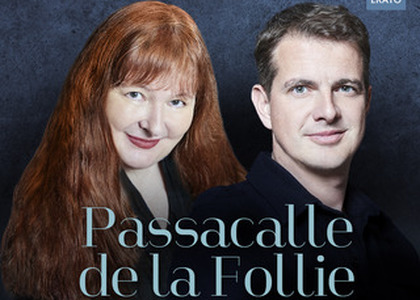Disk of 2023

Countertenor Philippe Jaroussky and L’Arpegiatta group, led by Christina Pluhar-“Passacalle de la Follie” – CD Review on April 7th, 2023
A new Philippe
Jaroussky album in the company of L’Arpegiatta group, led by Christina Pluhar
is an event adressed not only to the lovers of old music. After unforgettable
albums, which are praised and steadily listened to, like : "Monteverdi -
Teatro d'Amore", "Via Crucis", "Music for a While -
Improvisations on Purcell"- we are now offered a new theme- Arie for the
French aristocracy of the 18th century, under the name ”Passacalle
de la Follie”, launched under Erato on February 17th. There are many
years since Christina Pluhar, her musical group and countertenor Philippe
Jaroussky are collaborating. It is a charming experience, fueled by the passion
for performing this kind of repertoitre, which takes back its well-deserved
place in the music history, essential for the European civilization. It is also
fueled by the science of being able to adapt in a pleasant and accesible manner
to this old score and this is entirely the merit of Christina Pluhar.
I add here the special
vocal component, and by this I mean Philippe Jaroussky, who is so refined in
color, expression, agility and braveness when faced with an unknown repertoire.
I quote from the presentation of the album: “There are pages of refined
expression which convey love, regret, but also spiritual reflections”. The
title "Passacalle de la Follie" is inspired by an Arie - "Yo soy
la locura", written on a Spanish text by Henri Le Bailly, a court
musician.
Christina Pluhar is a
theorbo player, the leader of the musical group ”L’Arpegiatta” (founded in the
year 2000) and she is taking upon herself the concept and arrangement of this
French Arie from the 18th century.- a celebration for the mind and
soul, a tribute to love, paid in a sublime art, during a restless century,
dominated by political assassinations.Louis XIII inherited the throne at 9
years old, after a period of regency under his mother, Marie de’Medici-a bloody era, but with key characters who
loved arts.As such, in France, a number of authors who compose this kind of
arie are praised. The term first appeared in a collection signed by Adrien Le
Roy in 1571 and remains in the attention of the French aristocracy until the
early years of Louis XIV's reign – who was of course passioned more about
elaborated forms such as court ballet, comédie-ballet
and later, lyrical tragedies.
But coming back at these aristocracy Arie, the most
well-known composers are Pierre Guédron, Antoine Boësset, Étienne Moulinie and
Michel Lambert. We find them in this album with one or more arie, along with
other names and several instrumental pages signed by Robert de Visee and Marin
Marais, certainly an option meant to offer diversity of musical discourse.
The beauty is immeasurable and listening to them is
extremely pleasant. I do not remember the extraordinary qualities of the
interpreters, but we know them well, we admired them in the last edition of the
"George Enescu" International Festival (we hope to have this
opportunity again). Until then, we are enjoying these new discography
appearances.














